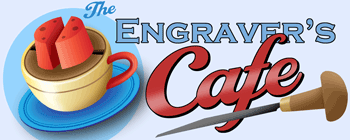James Miller
Member
James, in your post 'the use of a scorper' would I be correct in assuming that your 'scorper' it's what we 'yanks' call a flat?
"we used to soft brush the facetted star faces using a soft bristle hand brush and french chalk as an abrasive," It doesn't seem that the chalk would have any effect on the metal if one uses a soft bristle.?
One other question, do put a heel on your half round gravers?
Thanks for your patience.
Kevin P,
Hi Kevin,
Yes I think what I call a scorper is the same as your flat. My flat scorpers are in all widths from 0.5mm. up to 4mm., some are wider on the cutting face than the rear but most are parallel widths. When starting a new scorper, I will grind the cutting end as I have shown in a previous posting on this thread, but I also anneal, harden and temper the scorper cutting end before final sharpening and use. I temper the scorper to a light straw colour, if that makes sense.
As to the use of chalk and a bristle brush, it is not really an abrasive as the intention is to try and save the sharp facetting appearance of the bright cutting with a scorper, the idea is to have a near mirror finish on the cutting face of the scorper which leaves a bright cut on the metal, which was silver on the KCB shown.The chalk is just like using rouge to finish, but this method retains the sharp edges, polishing with an electric mop rounds off the sharp cut edges on the facet.
My half round scorper are straight, with no heel, if I have ever needed to cut textures inside a deep hollow shape I have annealed the tip of the half round and shaped it over a steel bar to give a curved blade, then I re harden, temper and reploish the half round face with 000 emory paper as before.
Here is a photo of a CBE badge, the texture under the enamel was cut with a polished half round scorper. I spent the first 15 years of my experience in this trade making these orders of UK insignia.
James




 LOL
LOL


